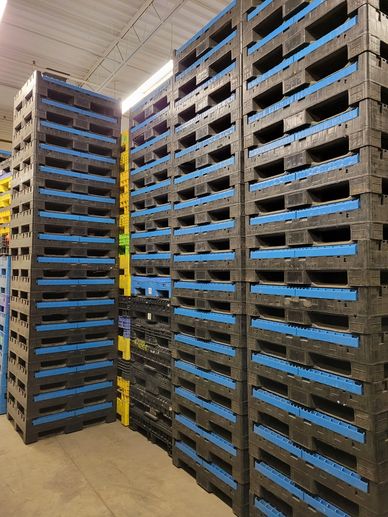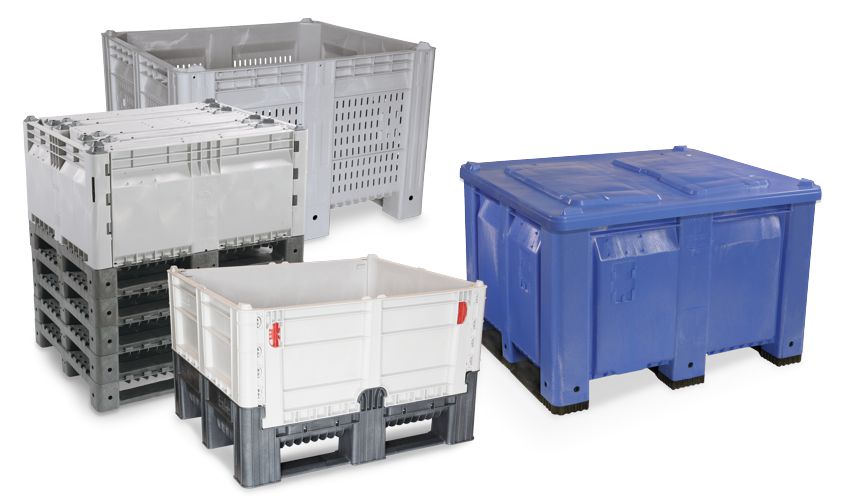The Ultimate Guide to Picking the Right Mass Containers for Your Business Demands
Choosing the proper bulk containers is critical for any type of organization that depends on effective logistics. Various kinds of containers exist, each made for specific materials and applications. Elements such as dimension, product compatibility, and regulatory criteria play a considerable role in this decision-making procedure. Understanding these aspects can lead to boosted operational efficiency. Several services ignore crucial facets that can enhance their general efficiency and sustainability. What are these factors to consider?
Recognizing Various Types of Mass Containers
Mass containers function as crucial tools for organizations looking for reliable storage space and transport remedies. These containers can be found in different types, each made to meet specific functional demands. One usual type is the intermediate bulk container (IBC), which is optimal for granulated and fluid products, providing a balance of capability and maneuverability. Another prominent choice is the mass bag, or FIBC, suitable for dry, flowable products. These flexible containers are light-weight and can be conveniently delivered and saved. For heavier materials, inflexible mass containers are often used, giving durability and stability for risk-free handling. In addition, there are specialized containers tailored for hazardous products, ensuring compliance with safety and security regulations. Comprehending the distinct attributes of these bulk container kinds allows services to make educated choices that optimize logistics and reduce prices. By selecting the best container, business can improve their operational effectiveness and simplify their supply chain processes.
Trick Material Considerations for Bulk Containers
When selecting mass containers, it is essential to contemplate the materials utilized in their building. Elements such as durability, chemical, and strength compatibility play a crucial function in making certain the containers meet specific functional needs. Additionally, weight and portability worries can influence both efficiency and transport logistics.
Product Sturdiness and Strength
Longevity and stamina are critical factors in picking products for mass containers, as they straight affect the container's capacity to hold up against various ecological conditions and handling processes. Products such as high-density polyethylene (HDPE), polypropylene, and stainless steel are generally favored for their robust buildings, supplying resistance to influence, abrasion, and temperature level changes. The option of material likewise impacts the overall life expectancy of the container; stronger materials commonly result in much less frequent replacements, bring about cost savings with time. In addition, the weight of the material can influence shipping prices and convenience of handling. Companies have to consider their specific operational atmospheres and the possibility for wear and tear to assure peak longevity and stamina in their bulk container option.
Chemical Compatibility Elements
Recognizing chemical compatibility is essential for picking mass containers, as the products utilized should stand up to the particular materials they will hold. Numerous factors affect compatibility, including the chemical nature of the materials, temperature, and period of storage. Destructive chemicals may require containers made from stainless steel or specialized plastics that stand up to destruction. Furthermore, responsive materials can generate warmth or gases, demanding vented or pressure-rated containers. The choice of container product, whether metal, polyethylene, or polycarbonate, must align with the chemical buildings of the stored compounds to stop breaches or leaks. Ultimately, a comprehensive analysis of these compatibility aspects guarantees risk-free handling and storage space, safeguarding both personnel and the environment while keeping item stability.
Weight and Transportability Problems
Selecting bulk containers involves not only assessing chemical compatibility however also considering weight and transportability. Services have to analyze the simplicity of handling and transport to maximize effectiveness. Lightweight products like high-density polyethylene (HDPE) or light weight aluminum can assist in much easier motion and minimize shipping prices. Conversely, much heavier containers might supply improved longevity but can hinder wheelchair, particularly in environments needing constant relocation. Furthermore, the layout of the container should permit practical lifting and stacking, making certain ergonomic safety and security for workers. Firms must likewise consider the framework available for transport; for instance, containers suitable with forklifts or pallet jacks can improve procedures. Eventually, the right balance in between weight and transportability straight influences operational performance and expense efficiency.
Sizing Your Mass Containers for Optimum Effectiveness
When sizing bulk containers, businesses should very carefully analyze the measurements called for to suit their particular products. In addition, weight capacity is an important element that influences performance and security throughout transport and storage space. Reliable sizing not just optimizes space yet also optimizes functional workflows.
Establishing Container Dimensions
Picking the best dimensions for mass containers is crucial for maximizing efficiency in storage space and transportation. Organizations need to analyze their specific needs, considering aspects such as offered room, the nature of the products being stored, and the approaches of transportation utilized. Precise dimensions assure that containers fit ideally in storehouses and automobiles, lessening thrown away area and minimizing managing time. Requirement dimensions can use convenience, but customized measurements could be needed for special demands or to accommodate particular items. Additionally, it is very important to examine stacking abilities and accessibility, as these factors influence general functional effectiveness. Ultimately, the appropriate measurements bring about enhanced organization and streamlined logistics, profiting the overall productivity of the business.
Weight Capacity Considerations
Recognizing weight capacity is vital for businesses intending to maximize their mass container performance. The weight capability of a container straight influences storage space capacities, transportation logistics, and general functional prices. Selecting containers with the appropriate weight limitations assures that services can safely keep and move their products without taking the chance of damages or compliance concerns. Overwhelming containers can bring about architectural failings, while underutilizing capacity results in lost resources. When selecting containers, it is vital for businesses to examine their item weights and think about any type of regulative requirements. Furthermore, aspects such as the kind of product, intended use, and environmental conditions need to additionally affect weight ability choices. By assessing these components, organizations can enhance efficiency and assure a structured supply chain.
Regulatory Conformity and Safety And Security Criteria

Governing compliance and safety standards play an essential duty in the choice of bulk containers for businesses. Organizations has to ensure that their containers fulfill numerous laws set by local, national, and global authorities. These requirements usually relate to product security, structural integrity, and proper labeling, which help prevent mishaps and assure the risk-free transportation of products.
In addition, adherence to industry-specific guidelines, such as those from the Food and Drug Management (FDA) or the Occupational Safety And Security and Wellness Administration (OSHA), is important for firms handling dangerous products or food. Non-compliance can lead to fines, lawful concerns, or damages to a business's credibility.
Organizations ought to also take into consideration the container's compatibility with the materials being saved or delivered to prevent contamination or chain reaction (used plastic containers). To sum up, recognizing and carrying out regulative compliance and safety and security criteria is crucial for the liable and reliable use mass containers
Sustainability Alternatives for Eco-Friendly Bulk Containers

Firms are additionally checking out choices made from recycled materials, which not only conserve sources but also support the recycling sector. In addition, developments in layout enable lighter containers that require less power to transportation, additionally boosting sustainability. By integrating these eco-friendly bulk container alternatives, businesses can demonstrate their commitment to ecological stewardship while satisfying consumer demand for sustainable methods. This change not just aids the world but can additionally enhance brand online reputation and consumer commitment.
Cost-Effectiveness and Budgeting for Mass Containers
While several services concentrate on sustainability, cost-effectiveness remains an important variable when choosing mass containers. Organizations has to assess the initial purchase rate, in addition to long-lasting operational prices, to guarantee monetary viability. Factors such as maintenance, longevity, and reusability play a substantial role in figuring out general expenditures.
Spending in high-quality containers might generate greater upfront expenses yet can bring about financial click here savings with minimized substitute prices and decreased waste. In addition, services need to consider transport prices and storage effectiveness, as these can impact the total budget plan.

Regularly Asked Concerns
How Do I Determine the Right Container for Hazardous Materials?
To establish the best container for dangerous materials, one have to assess compatibility with the compound, think about the container's product, check for regulative conformity, and analyze ability and safety and security functions to assure appropriate handling and storage.
Can Mass Containers Be Custom-made for Certain Products?
Yes, bulk containers can be customized for particular products. used collapsible containers. Different features, such as material, size, and style, can be customized to meet distinct needs, guaranteeing optimal safety and effectiveness for delivering and storing different items
What Is the Average Life Expectancy of Different Bulk Container Kind?
The ordinary life expectancy of mass container kinds differs; plastic containers last 5-10 years, metal containers 10-20 years, and wooden containers generally last 3-7 years, depending on usage, maintenance, and environmental problems.
Exactly how Should I Tidy and Maintain Mass Containers?
To cleanse and preserve bulk containers, one should on a regular basis evaluate for damages, eliminate deposit, clean with appropriate detergents, rinse extensively, and assurance correct drying out before storage space. Adhering to supplier standards improves durability and safety and security throughout use.
Exist Rental Options for Mass Containers Available?
Yes, countless business offer rental choices for mass containers, supplying versatility for companies. These leasings can accommodate numerous requirements, permitting business to manage inventory efficiently without the commitment of buying containers outright.
Longevity and stamina are vital elements in choosing materials for mass containers, as they directly affect the container's ability to withstand numerous ecological conditions and managing processes. Recognizing chemical compatibility is necessary for choosing bulk containers, as the products used have to resist the particular materials they will hold. Recognizing weight ability is crucial for businesses intending to enhance their bulk container efficiency. Regulatory compliance and safety and security standards play a crucial duty in the choice of mass containers for companies. While numerous companies concentrate on sustainability, cost-effectiveness stays a vital aspect when choosing bulk containers.